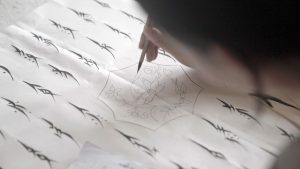Our friendship began with mutual deception.
Though, I should perhaps describe it as a shared misrepresentation, both of us unwilling to narrow our potential options on the popular dating app where we matched. He confessed shortly after we matched that he was “ethically nonmonogamous,” a vague term I associated with men who wanted to date casually without any obligation of emotional intimacy or responsibility. He clarified: I have a primary partner I don’t get to see very often so I am looking for new connections, romantic or platonic, but I understand if that’s a nonstarter.
I responded quickly: It is a nonstarter for dating, but I should disclose—I’m a trans woman.
He was unperturbed, or at least feigned indifference, and suggested we could hang out as friends. He would be getting ice cream either way. Where and when? I asked, and he suggested we meet at 6pm at the neighborhood Italian ice place.
His proposal of friendship intrigued me. Because I haven’t had a single close male friend since I hit puberty, and I was curious to determine whether I enjoyed spending time with men without the illusory salve of sex. Recently, I had begun to feel dispirited, overwhelmed by the pressure to perform desirability or agreeability while on a date, even if my counterpart wasn’t showing me the same consideration, which had been detrimental to my self image. My therapist and I agreed it might be illuminating to have relationships with men rooted first and foremost in shared interests and values. To spend an evening with someone without the premise of being assessed as a potential romantic prospect.
I also wondered if our meeting might provide insight into the opposite sex, or assuage my increasing mistrust and apathy toward men, which was teetering toward unrestrained misandry despite my self-professed skepticism of gender essentialism and heteropessimism—both of which often suggest men are incapable of rewarding, reciprocal emotional relationships and are likely predestined to dissatisfy or harm the women with whom they interact.
I aimed to prove my relationships with men would not always be characterized by disappointment, emotional distress, or explicit harm. I want to believe men are not a risk despite the accruing evidence otherwise.
Inversely, I supposed, if my relationships with men would always be risky, I wanted to understand why I continued to pursue them.
I have become interested in the concept of and cultural attitudes toward risk itself in order to answer this question. Both a noun and verb, risk’s respective definitions include the possibility of loss or peril or exposure to hazard or danger. Etymologically, risk is commonly associated with a Greek navigation term often used as a metaphor for “difficulty to avoid in the sea,” later describing the chance of loss. I began to practice a cautious apprehension in my relationships with men, learning to identify subtle phrases or behavior that might indicate immediate or long-term peril.
I must admit I find it difficult to write about risk when I use the term as a catchall for a wide variety of dangers—the risk of seeking platonic or romantic connection with another person, disease or injury, banal emotional disappointment, violence at the hands of a sexual partner or the state, existing as a trans woman in the US, death—without clearly delineating between the severity. But I enjoy the slipperiness of this overapplication, which itself carries the risk of misrecognition. If my aim was to befriend a man, I knew it was unlikely such a connection would not brush against the boundaries of other forms of intimacy, like sex, as many of my friendships often do, and that this openness in my experiment presented the most obvious risk.
My attempts to shield myself from emotional or physical harm were futile; another man I met for coffee under the guise of friendship weeks earlier was nervous during our conversation and kissed me outside the cafe afterward. He confessed he had lied about the timeline of his recent breakup, which actually happened two weeks prior rather than two months. I told him this explained both our nervousness and then corrected myself, blaming him for the awkwardness of our interaction. We said goodbye.
The following morning, he texted and explained he had changed his mind. He was not gay enough to have sex with someone who had a penis. We had agreed beforehand we would not sleep together and had never discussed my genitals. His rejection was rooted in his shame, which was based on assumptions about both my body and potential desire to have sex with him. Could I consider this a loss? My ego was injured, for sure, though I suggested we could be friends regardless to avoid admitting the failure of my experiment.
My friendships with women included a small number with whom I had sex or dealt a similar rejection, and I wondered if it was possible my friendships with men could similarly navigate unresolved or unconsummated sexual tension. If we ignored this unfortunate exchange, I imagined I would be inoculated somehow against such disappointment or harm with other men in the future. We never messaged again.
When I mentioned I was thinking about risk and my relationships with men during a dinner a week earlier, my friend gleefully announced she had recently picked up a copy of artist and filmmaker Derek Jarman’s At Your Own Risk from Torn Light Records, her excitement stemming from the mere coincidence of the title. But I flipped through the book and was drawn to a passage where Jarman wrote: “I was once given a blow job by a male nurse while attending a clap clinic, he said: ‘I’ll just have to give myself a jab, but it’s worth it.’”
I laughed when I read this line, because of its incredulity. Why would this nurse risk contracting gonorrhea, or another STI, to suck Jarman’s dick? Is such a risk only tolerable because a remedy is at hand? The nurse’s behavior could be characterized as self-neglect, a willingness to endanger oneself for this fleeting moment of connection and pleasure. Perhaps his approach represented a more enlightened position. After all, this could always be his last chance, age would undoubtedly make him less desirable, and death was always waiting on the near horizon.
The same friend later suggested I read the philosopher Anne Dufourmantelle, whose writing about risk surged in popularity after she died while trying to rescue two children caught in turbulent waters off the coast in Pampelonne beach in Southern France. In earlier passages of her book In Praise of Risk, she writes: “the instant of decision, the moment of risk, inaugurates an other time, much as trauma does.” She writes about the risk and necessity of connection, love, dependency. For Duforumantelle, risking dependency is a sign of friendship, and that love is an art of dependency.
Meeting this stranger for Italian ice did not pose such an obvious and immediate risk to my sexual health or the danger of unreciprocated dependency. We had agreed sex was off the table. And I had dependable friendships.
However, sex was on my mind when I approached my prospective friend outside the Italian ice shop, of course. Because I only ever met men under the guise of fucking. He was sitting on one of the plastic lawn chairs lined along the building and wearing a green baseball cap as promised. His identifier. He stood and introduced himself, “I’m Peter.” I was grateful for the reminder because I had already forgotten.
I was glad to realize I was not initially sexually attracted to him and therefore unlikely to backtrack on our agreement: our meeting would be solely platonic. He was several inches shorter than me and had thin blonde hair and a large, uneven nose that looked like it had been broken several times. His appearance was oddly nondescript yet imposing, like a traffic cone. I couldn’t decide if he was attractive generally. He confessed he had already ordered and apologized, and I reassured him before joining the line to order my own, a combo, lemon and raspberry.
He suggested we walk to Palmer Square where we could walk laps around the park and ask each other biographical questions; We both grew up in Michigan. He was from a city in Northern Michigan often described as the “Napa Valley of the Midwest,” a descriptor that caused him to sigh when I mentioned it. We discussed photographers we both enjoyed because he considered himself an amateur photographer. He had become interested in Vivian Maier after seeing an exhibition of her photographs at the Art Institute of Chicago. I introduced him to Paul Mpagi Sepuya and Sam Contis. While we talked, a couple laid out a picnic blanket several yards ahead of us and began to make out while the sun set. We watched ambivalently, occasionally remarking when the couple changed pace or position, as if we were observing fish swim about their aquarium and trying to identify a pattern to their behavior.
We decided to continue our conversation at a nearby pizza parlor. We discussed books. I shared I had recently read several books written before, during, and following the height of the AIDS epidemic in the 80s and 90s—Nate Lippens and David Wojnarowicz. Each wrote about this era of sexual risk and their searches for sexual encounters with other men.
I removed my new copy of Memories that Smell Like Gasoline by Wojnarowicz and read Peter a short passage I enjoyed.
In the scene, Wojnarowicz describes a man he meets in a Greek diner. He is attracted to the man’s muscular body even though he is covered in scrapes and bruises. For Wojnarowicz, these injuries suggest danger. But the evidence of violence appeals to him because it “floats like static electricity that completely annihilates the possibility of future or security.” Without the possibility of the future, we are forced to live moment to moment without the illusory safety promised by our supposedly organized world. And strikingly, Wojnarowicz writes, “…it’s also what happens when violence hangs above the road to the sexual act, that gets subverted within the series of small kisses at the base of my dick or across the underside of my balls. The sweetness of the sad lips of that criminal face lowering itself around my dick and the quiet sucking motion that I guide him into.”
As I recited Wojnarowicz’s words, I remembered the sense of recognition I experienced when I first read these sentences, exhilarated by the familiarity of such an encounter with a man. I enjoyed a similar contrast between sweetness and violence in my relationships with men. I spotted a note in the margins as I reached the end of the page. The name of a man I slept with while in Houston. We had recently reconnected while he was in Chicago for work. He was handsome and several inches taller than me. The first time we slept together, he fucked me with his delicate-looking fingers so roughly that I noticed small droplets of blood while using the bathroom afterward.
The second time we had sex, he interrupted to fetch his phone from his jacket and asked if he could record. I agreed, as long as my face wasn’t in the video, a meaningless condition since the tattoos on my chest and abdomen were easily identifiable. Mostly, I wanted to shield myself from seeing the video later and becoming unnerved by whatever expression I wore while getting fucked: ecstasy, dissociation, pain, or worse—some unrecognizable happiness.
I wasn’t sure why I agreed. Perhaps because it was easier, less cumbersome, and I wanted to appear carefree and game. But I wondered whether he would use the video as a record of his sexual exploits or if he would upload it to some online database where other men who fucked trans women could watch. I considered asking him to delete the video after but hesitated. The left side of my face ached where he had struck me earlier, and I was reluctant to discover whether his violent streak extended beyond our consensual, sexual arena.
Plus, I enjoyed his feigned post-coital romance. The sweet nothings. His suggestion that I could cook for him or that we could spend a weekend together as if I preferred these intimate, domestic illusions to his calloused grip around my neck. I was willing to endure his brutality in exchange for a moment of domestic intimacy.
Why do you think you like his writing so much? Peter asked after sipping his High Life. I paused to consider. I think I understand him, or at least his relationship to violence, particularly his attraction to men. I like a similar contradiction, when I feel like I’ve won a moment of sweetness or gentle intimacy even if their mood sours later, after the bliss of their orgasm has dissipated, or their suspicion our interaction might represent something more significant about themselves and their relationship to the world. I am chasing after those hard-won moments, I explained. And maybe trying to befriend men feels like a safer method to understand my attraction.
“Ah, you’re kind of like an anthropologist studying them,” Peter laughed and added, “I’m the same way about women, I think.”
I invited Peter to join me for a screening of Cold Water by Olivier Assayas at FACETS. The theater was showing the film as part of their 50th Anniversary series, which featured other notable works FACETS had shown and championed throughout their history. FACETS had shown Cold Water two decades before its official US release, which was delayed until 2018 due to uncleared music rights. I thought the film would be a nice opportunity for Peter and I to deepen our relationship. After all, most of my friendships centered around watching and discussing movies.
Peter messaged the morning of the screening, and I thought he was confirming our plan. However, his text was unrelated: Riley, I’ve been thinking about you and think I should tell you I will probably want to fuck you after bottom surgery. Sorry if that’s TMI.
I set my phone face down, walked to the bathroom, and finished my normal morning routine before returning to read his message again, as if I expected it to change or disappear like a wondrous dream fading from memory as I gradually entered the conscious world again.
I was confused by the message, which seemed to imply our friendship was tenuous and conditional, dependent on his ability to remain not attracted to me. Yet, I was frustrated because his confession of attraction was conditional on my anatomical change even though he had obviously fantasized about fucking me. My pussy already existed in his fantasy. But he had to project his desire into the future where I would be more passable and no longer pose a threat to his self conception or social status. And I was oddly elated because his confession was evidence of one of my main motivations for vaginoplasty; I wanted to have vaginal sex as a heterosexual woman.
I finally replied, Thank you for letting me know. I think I would prefer it if we didn’t see the movie together. I understand, he responded quickly. Our conversation ended.
When I shared Peter’s message with a friend, she was disgusted and implied his message was violent and traumatizing. Was this true? Was this the difficulty that awaited me in my search for male friendship? Feeling objectified or rejected? His message was banal and unextraordinary. Countless women I knew often fielded such sexual or romantic advances from their male friends. His advance represented a general cultural attitude toward and fear of my transsexual body which I could understand as violent when I recognized it as pervasive, societal, rather than merely interpersonal. He did not want to fuck me pre-vaginoplasty because such sex would be more transgressive during a politcal atmosphere of anti-trans violence. Perhaps I had been naive to assume friendship with men would be less complicated than my romantic entanglements.
I invited my friend Vera to join me for a screening of Cold Water. I was late, so we quickly hugged before hurrying into the theater. Afterward, we skipped the Q&A between FACETS’ film program director and a local Chicago critic and sat in the lobby to discuss the movie and gossip about our respective lives.
I asked Vera if she had ever seen Demonlover, another Assayas film. Vera had not. I briefly explained the premise: two French corporations battle for financial ownership of a Japanese 3-D hentai company, but I adore the movie because of Assayas’ ability to follow everyday transactions in order to capture the twenty-first-century experience of being buried alive under data.
There was a transaction in Cold Water I continued to think about after and brought up Demonlover in order to transition our conversation to discuss the scene that bewildered me and see if Vera had a compelling analysis; the troubled, headstrong teenage couple, Christine and Gilles, are caught shoplifting records. Christine is arrested and later sent to a mental institution by her father while Gilles escapes and rendezvous with a classmate in the school bathroom for an illicit deal, exchanging the stolen records for dynamite, which his classmate warns cannot be defused once lit. Neither Vera nor I could recall if Gilles or his classmate discussed the intended use of the explosives.
Gilles’ father confronts his son about a call from the headmaster who suggests Gilles should be transferred to a boarding school at his mother’s request. His father becomes frustrated with his son’s disaffected response and smashes a crystal ashtray on the floor to demonstrate his anger and perhaps his capacity for violence, which could easily be redirected into corporal punishment. Gilles is unmoved, and his father sinks onto the couch and calls for his son to join him. Vera and I were both endeared by the father’s anguish at the prospect of their separation. However, Gilles is frigid and unexpressive while they embrace.
Immediately following the revelation that he will be sent to boarding school, Gilles enters his younger brother’s room, asks him to deliver the dynamite to someone, and demonstrates how to arm the explosive by lighting the fuse. As the wick burned, I grabbed my armrest and clenched my jaw, expecting to witness a grotesque scene where the children would be dismembered and their bedroom destroyed. However, Gilles disarms the explosive in one swift motion.
I was disappointed the dynamite never returned, I told Vera. Because I thought it would be a sort of Chekov’s gun principle even if I understood it was elementary to hope for clear narrative resolution. But this brief scene became largely inconsequential during the latter half of the film after Gilles and Christine reunite at a party thrown in an abandoned chateau.
Later I scoured the internet for interpretations of this scene. One reviewer suggested the dynamite was likely connected to the May 1968 student uprisings in France, a period of protests, strikes, and militant activism responding to growing inequality for students and working class people as the country rapidly modernized after World War II. Set in early 1970s France, Gilles was likely purchasing the dynamite for some militant activist group. Whether Gilles is opinionated about his country’s politics was never explicitly named. Yet he clearly has an appetite for risk and causing mayhem, anything to disrupt the oppressive boredom of his home and school life—trafficking explosives, shoplifting, or defying his schoolteacher.
This image of the explosives and the danger they threatened continued to vex me afterward. I adopted it as an inexact metaphor for my naivety in my relationships with men as I described my recent attempts at befriending a man to Vera. In Cold Water, the dynamite is divorced from its political context and becomes solely a threat to Gilles and his brother even though the explosive will likely be used in a public demonstration. Gilles and Christine are brought together by their shared struggle against authority, whether their parents, schoolteachers, or the police. Their intimate lives are shaped by an unspoken public life.
In my relationships with men, I often willfully disregarded the political contexts shaping our individual interactions, unwilling to admit even my friendships with men would be affected by pervasive cultural transmisogyny. Neither I nor these men could name, or address, the political forces that intruded upon our relationship. I began to wonder if my desire to befriend Peter was an attempt to demonstrate my own cleverness, to light the fuse with blind faith I was quick enough to disarm it in time.
When I mentioned I was planning to write this essay as a response to risk and personal or cultural attitudes to violence, or the potential of violence, Vera asked a clarifying question: I’m very curious about your phrasing of ‘violence itself as a transformative force.’ Do you mean enacting violence, violence being done to you, or all of the above? Consensual or not? Physical or emotional? I’m interested in how you are defining violence.
I wanted to return to Dufourmantelle’s idea of risk as a transformative force and responded quickly to avoid losing my train of thought: I’m more so interested in the threat of interpersonal and political violence in this essay and what both make possible in relationships between people and/or the state. For example, I am curious about moments where the threat of violence imperils the boundary between the private and public, where they bleed into each other, if that makes sense. If men are dangerous, I wanted to understand how the potential of violence transformed our specific relationship and also how I understood pervasive cultural dynamics between men and women, specifically men and trans women.
When Peter professed his desire to have sex with me and made it contingent upon my eventual sex reassignment surgery, he reminded me that my cock is a risk, one of the difficulties I might encounter at sea. Regardless of whether the premise of our relationship was sexual or not, men would fear our proximity might make them a homosexual, a social outsider. Or worse, befriending or fucking trans women meant they were political agitators, members of a fringe, controversial ideology that the president’s son recently condemned as “worse than al Qaeda.”
This was partly responsible for the demise of my first and only long-term relationship.
My ex-boyfriend was sympathetic during our breakup. We sat on opposite ends of his leather couch, which was not large enough for the two of us to lay side by side, but we often did anyway. I laid on the outside, along the edge, flexing the length of my forearm and thigh in order to press myself into the leather and prevent myself from falling into the gap between the couch and coffee table, a precarious position that now feels like an exact metaphor for my experience of our relationship. He told me he regretted if his behavior had contributed to my belief that I would never be married. He had concealed my existence from his parents and several of his friends because he did not want them to think he was queer, a label he used openly to describe himself when around my friends or I.
However, I was no longer interested in litigating the specifics of our singular breakup. Instead, I wanted to relate the story of this incident with my ex-boyfriend to a passage from Nate Lippen’s Ripcord, a fragmented novel about an aging narrator working odd jobs and ensnared in an affair with a younger married man. In one scene, the thirteen-year-old daughter of the narrator’s friend asks why he never married. He responds: “I tell her I haven’t found the right one. I don’t say marriage didn’t exist as an option when I was young, and I learned to think and live outside all those situations. I don’t say part of rejecting the victim’s badge was turning what I was taught was wrong and disgusting about me into excess and glory. Make trauma into refusal.”
Since our separation, I have continued to grapple with the violent and often degrading ways my ex-boyfriend acted toward me, curious to assess whether such treatment from men was inevitable because of my gender, or if he was uniquely transmisogynistic. When we decided to reunite after several months apart, I made a risky decision, one characterized by my willingness to act against what I knew; My boyfriend was a cheater and had given me several STIs. But I naively thought I could refuse the role of victim. I wanted to transform our relationship from something shameful and disfiguring into a triumphant story of redemption, which I thought meant I had to risk suffering all the same treatment.
Vera asked me, perhaps inflammatorily, if I could remember the last time I had good sex. Yes, I answered quickly and described my earlier encounter with the man from Houston who filmed us fucking. I did not relay the detail about his documentarian impulse, instead focusing on the carnal intensity of our sex, the bruises that lingered for days afterward. She pressed further and asked if I could name the qualities that made it enjoyable. I paused, considered, and then answered: I think there’s so much eroticism in the brief intensity of a fantasy we both understand is a fabrication, but don’t acknowledge even though we know the encounter will eventually end. We are postponing the loneliness that follows any search for connection.
Your answer makes me want to watch the ending of the film again, Vera said, implying there was a parallel narrative in Cold Water, and I tried to recall the final scenes.
As the party ends, Christine asks Gilles to run away with her. She wants to join an artist commune in Southern France where they live without electricity or water. Christine guilts Gilles for hesitating, and he quickly succumbs to her pressure. They will hitchhike and flee from their parents’ oppressive authority together. Except Christine reveals to her friend she has no proof the commune exists. She has not exchanged letters with her friend Chloé, whose father, a painter, supposedly relocated to the commune, as she claimed. They are seeking a utopia Christine knows they will never reach. Perhaps she hopes their journey together will transform their circumstances without the need for a destination.
Gilles and Christine spend a wintry evening together near a river. Christine wades into the river after a trucker drops them at an abandoned structure in the countryside. The water is the color of indigo denim. She emerges from the water and joins Gilles in their makeshift shelter. They have sex, the first time the libidinal nature of their relationship is implied onscreen beyond heavy petting or kissing.
When Gilles wakes the next morning, he searches for Christine and discovers her clothes neatly folded near the river’s edge with a note. He opens the note, perhaps expecting an explanation for her disappearance, only to discover an empty page. Had Christine decided she could not bear responsibility for their exile if Gilles were to discover her subterfuge? Or had she grown tired of her powerlessness against the dangers of the world? Either way, she had surrendered.
After a brief lull in our conversation, I asked Vera if she knew about David Wojnarowicz’s affair with Jean Pierre Delage, a Parisian he met while visiting France in 1978. Wojnarowicz was 24. She confessed she wasn’t familiar. I tried to summarize their affair, which was the subject of an exhibition in 2022. They met in the bushes of Tuileries Garden, a popular cruising spot for gay men. They kissed but Delage exercised restraint, aware they risked arrest if they slept together in public, and insisted they move to his apartment where Wojnarowicz would live for the following nine months before he left France.
Delage encouraged Wojnarowicz’s early artistic endeavours and occasionally supported him financially. The night before he left Paris, Delage looked Wojnarowicz in the eyes and told him, “I never told you how much I love you because I was afraid to make it too heavy. I thought you might one day leave and I didn’t want it to be difficult.” After his departure, they exchanged letters and postcards for three years before Wojnaworicz ended their affair after Delage confessed he had slept with one of his lover’s friends. They remained friends, but their romance was over.
I admire their ability to reinvent their relationship, I explained to Vera, their ardent hope of sustaining their connection across time and geography, to avoid this greater disappointment of losing one another. Such a relationship which required them to believe a different world was possible.
I wondered if I was capable of a similar optimism. Peter recently texted and suggested we should see a photography exhibition at the Art Institute of Chicago together, and I agreed because I was eager to move past his unfortunate message and prove our friendship was still possible. That our connection might be worth the risk.

About the author: Riley Yaxley is most often a dinner party host, a fishkeeper, a beach rat, a flâneuse, a glutton, a flirt, a dancer, a delinquent daughter who forgets to call her mom; and she is also a writer and editor.

About the illustrator: Sammi Crowley was born and raised in the rural suburbs of Detroit. She received her BA in Fine Art from the University of the District of Columbia and aims to create images where the viewer has the distinct sense of encountering a memory they thought they’d forgotten.






